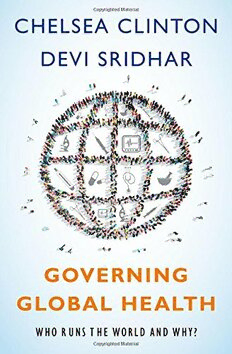Table Of ContentGoverninG
Global
HealtH
•
GoverninG
Global
HealtH
•
Who Runs the WoRld
and Why?
Chelsea Clinton and Devi Sridhar
1
1
oxford University Press is a department of the University of oxford.
it furthers the University’s objective of excellence in research, scholarship,
and education by publishing worldwide. oxford is a registered trade mark of
oxford University Press in the UK and in certain other countries.
Published in the United States of america by oxford University Press
198 Madison avenue, new York, nY 10016, United States of america
© oxford University Press 2017
all rights reserved. no part of this publication may be reproduced,
stored in a retrieval system, or transmitted, in any form or by any means,
without the prior permission in writing of oxford University Press,
or as expressly permitted by law, by license, or under terms agreed with
the appropriate reproduction rights organization. inquiries concerning
reproduction outside the scope of the above should be sent to the
rights Department, oxford University Press, at the address above.
You must not circulate this work in any other form
and you must impose this same condition on any acquirer.
names: Clinton, Chelsea, author. | Sridhar, Devi lalita, author.
title: Governing global health : who runs the world and why? / Chelsea
Clinton and Devi Sridhar.
Description: new York, nY : oxford University Press, [2017]
identifiers: lCCn 2016022370| iSbn 9780190253271 (hardcover : alk. paper) |
iSbn 9780190253295 (e-book) | iSbn 9780190253295 (e-book)
Subjects: | MeSH: World Health organization. | Global Health |
international Cooperation
Classification: lCC ra441 | nlM Wa 530.1 | DDC 362.1—dc23
lC record available at https://lccn.loc.gov/2016022370
1 3 5 7 9 8 6 4 2
Printed by Sheridan books inc., United States of america
For Charlotte and aidan, with all my love, Chelsea
For sadegh, with all my love, devi
Table of ConTenT s
•
Preface viii
abbreviations xiii
1. Governing Global Health 1
2. big Questions and Case Studies 23
3. Shifts in Governance 48
4. Who Funds Global Health? 83
5. twenty-First-Century Governance 119
6. Disruption and reform 161
7. Final reflections 202
notes 217
index 267
vii
PrefaCe
•
Throughout our travels across the world, whether to slums in new
Delhi, health clinics in Port-au-Prince, or ministries of health in liberia
and brazil, the health of all people has been at the forefront of our
minds. How can we, alongside so many others, make a contribution to
global health?
That question is what prompted us to write this book. The same
question should be at the top of the agenda set by every government,
international development institution, and nongovernment organiza-
tion (nGo). While health policy debates raise enormously complex
issues about institutions, finance, behavior, and the role of markets, no
issue has a more profound bearing on the human condition than
health. as mothers of young children, we are acutely aware of the role
that health systems play during periods of vulnerability. efficient and
equitable health systems save lives and break the link between sickness
and poverty. They are an integral part of the social contract.
We are also aware that for millions of women, children, and disad-
vantaged people around the world, the absence of efficient, effective,
and equitable health systems is a source of vulnerability and distress,
and part of a vicious cycle of poverty. our concern in this book is to
ask what at a global level can be done to change this picture.
viii
preface ix
Why now? at first glance, we live in the best of times of public
health. People live longer than ever before. Child mortality is falling at
an accelerating rate. in the first fifteen years of the twenty-first century,
child deaths fell from ten million to just under six million deaths per
year. according to UniCeF, roughly forty-eight million lives have
been saved through a combination of more skilled birth attendants
and higher vaccination rates (along with increased economic develop-
ment and girls’ education, and other factors).1 Major killers like malaria,
pneumonia, measles, and Hiv/aiDS are in retreat in the face of im-
proved access to effective prevention, care, and new medicines. in all of
these areas, national policy backed by international cooperation has
made and continues to make a difference. Untold millions of people
are living healthier, more productive, and longer lives than ever before.
viewed from a different perspective, we are living in the worst of
times. never has the gap between what we are capable of achieving—
based on what we already know works—and what we actually achieve
been greater. Hiv/aiDS rates are not falling for all populations, every-
where. in 2014, tuberculosis, one of the world’s oldest diseases, claimed
more lives than Hiv/aiDS. and, while we live in a world of astonish-
ing technical progress and scientific advance, every year one million
children die on the day of their birth and another million die in their
first week. if there is one figure that demolishes any cause for compla-
cency over what we have achieved since 2000, it is the sixteen thousand
child deaths that occur every single day. The overwhelming majority of
these deaths could be prevented through simple, effective, and afforda-
ble health interventions or preventative measures we know work. Yet the
human toll continues.
For anyone needing a reminder of the destructive potential of ill
health it arrived in the form of the 2014/2015 ebola outbreak. The epi-
demic was preventable and containable. Yet more than twelve thou-
sand people died and worldwide fear about a global pandemic took
hold.
both the ongoing crisis in child mortality and the ebola epidemic
illustrate in very different ways what happens when health systems fail.
of course, what is achievable in health is influenced by national wealth.
Yet we know of all too many cases of relatively wealthy countries that
achieve far less than they could, in part because of their failure to

